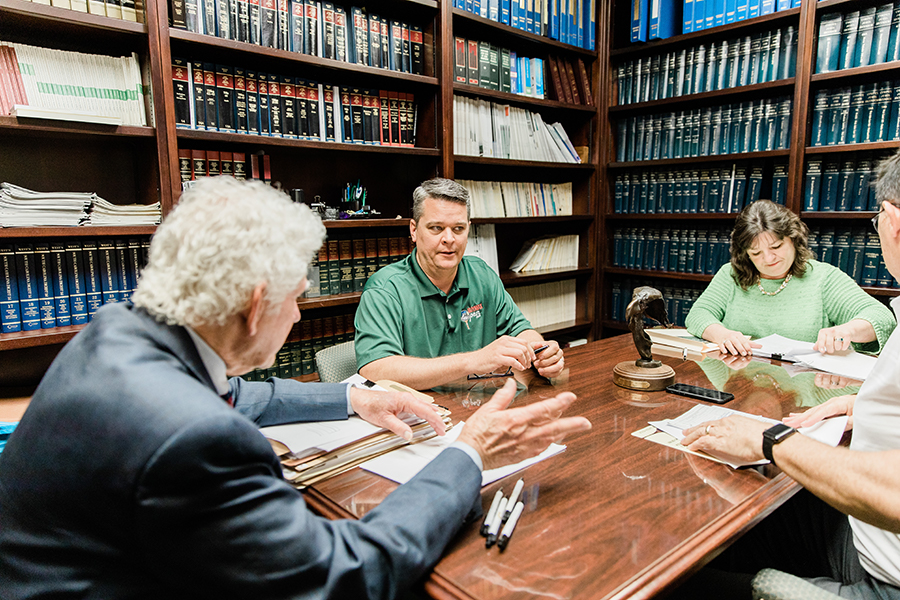Mediation is a process in which a neutral person, the mediator, helps people involved in a dispute to negotiate effectively with each other, promotes constructive and creative bargaining tactics, brings the parties to closure, and ties down the settlement terms in writing. It is an area of expertise sanctioned by the American Bar Association and the South Carolina Supreme Court to settle disputes in a manner that helps to alleviate the overburdened court system. Court litigation can take a long time, a lot of expense, and causes much financial and emotional stress. Sadly, too much litigation can produce aggravations and often egregious winners or losers. Mediation can help to accomplish negotiations towards improved results for all of the parties involved.
During mediation, a trained, skilled mediator works to assist the parties involved to reach an amicable solution that allows for both sides to heard, considered, and satisfied. Mediation is different from arbitration and litigation, or other forms of resolution, because the process allows for the parties to hold greater control over the outcome of their dispute. The involved parties become the ones to determine the information that is disclosed, the options that are put into consideration, and they ultimately determine their own settlement agreement.
 Participants of a mediation are allowed to take as much time as they need. The process can be paused for recesses when more information needs to be gathered or exchanged. The trained mediator does not make a judgment on which party is right or wrong, yet they will guide each side towards the facts to be considered, the options that are available, and builds an increased understanding of each individual’s concerns. Settlements that are reached via mediation are often better for everyone involved because of having been thoughtfully and thoroughly worked out with each participant’s best interests in mind. Mediated settlements frequently become permanent because the outcome has been weighed and agreed upon in a more relaxed environment. The creative solutions reached through the help of a calm mediator are free of much of the stress and emotional upheaval that one may experience in a cold and crowded courtroom.
Participants of a mediation are allowed to take as much time as they need. The process can be paused for recesses when more information needs to be gathered or exchanged. The trained mediator does not make a judgment on which party is right or wrong, yet they will guide each side towards the facts to be considered, the options that are available, and builds an increased understanding of each individual’s concerns. Settlements that are reached via mediation are often better for everyone involved because of having been thoughtfully and thoroughly worked out with each participant’s best interests in mind. Mediated settlements frequently become permanent because the outcome has been weighed and agreed upon in a more relaxed environment. The creative solutions reached through the help of a calm mediator are free of much of the stress and emotional upheaval that one may experience in a cold and crowded courtroom.
Virtually any type of conflict can be settled using mediation. Almost all types of conflicts stem from an individual’s perceptions and beliefs about what they want or feel. Each party has their own opinions of their responsibilities, rights, needs, and entitlements. When the conflict is examined closely by a neutral mediator, details are often found that may have not been noticed before by the parties involved. Information is gleaned from both sides, shared, and discussed openly. Each of the parties are invited to be actively involved and end up seeing that there is always more to the story. The mediation process aids in making the dispute less personal and allows for focusing on options of resolution over that of proving which side is winning. The goal is to guide both sides towards a more balanced and fair result.
Confidentiality and sensitivity can be critical in certain disputes. Mediation allows for a more intimate and private setting than a court environment where personal information may get put on display. This is especially important for public figures and those whose reputations need to be carefully maintained. Open arbitration or litigation may lead to further difficult feelings between the disputing parties, and creates further stress and hostility. The mediation process is an ideal alternative for privacy and equanimity in reaching a settlement.
Like assembling the pieces of the puzzle, we can provide and gently manage a process wherein parties in dispute can analyze best interests, negotiate to their best ability, and reach a resolution of their own design and choice. Choose Floyd Mediation Group, LLC to help you. We will bring a fresh approach to your case. We are not bound by prior statements of what is “relevant and doable” and can be flexible and innovative to help you settle your case in a cooperative and informal setting – rather than a legal and formal manner.